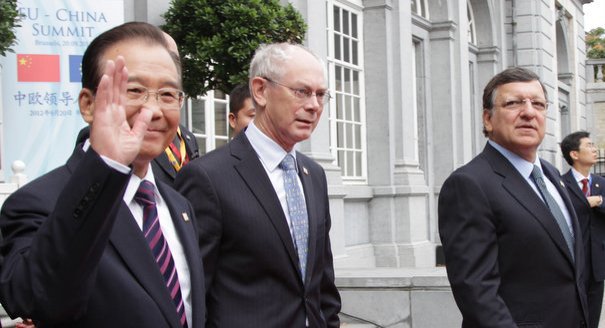It is now obvious that China’s economic rise is shaking the foundations of security relations in the Asia-Pacific region. Beijing is challenging the status quo, assessing whether neighbors can be pushed into accepting Chinese territorial claims—and whether America’s “pivot” to the Asia-Pacific is backed by political will and military muscle. The risk is, of course, that Beijing will let the genie out of the bottle and won’t be able to put it back in again. Stimulating popular nationalism, as the Chinese leadership is currently doing, is a risky game, especially in an autocratic political system where opinions and options cannot be debated openly.
While all eyes were on the escalation between China and Japan, the second and third largest economies in the world, the final press statement from Barroso and Van Rompuy made no mention of it. The Joint Press Communiqué offered nothing more than the usual platitudes, praising China and the EU as “crucial actors in advancing peace, prosperity and stability”, saying that both sides “affirmed and highlighted the continued good cooperation in the field of crisis management, counter-piracy and maritime security.” According to Markus Ederer, EU ambassador to Beijing, Wen at very least “briefed the EU side on the current disputes in the East China Sea” (quoted in a report about an event at the EU-Asia Centre).
It has been said that the EU is not a player in Asian security, especially when compared to the United States. This is a reasonable assessment, given the EU’s deteriorating military capabilities, its growing unwillingness to get involved in conflicts in faraway countries, and its unchanged lack of foreign policy ambition in general. On the other hand, the EU must realize that it has an existential interest in playing a role in the Asia-Pacific’s security.
Europe’s economic interdependence with the region—trade and investment—makes it highly vulnerable to any disruption. Armed conflict would be a worst-case scenario and should be prevented by any available means
The rise of China is obviously the biggest foreign policy challenge of the early twenty-first century. Europeans are part of the story, whether they like it or not. What they say and do is part of the international environment in which China’s rise takes place. If leaders in Beijing make strategic decisions, their views and expectations of Europe are part of the equation. The kind of power China will become, and how its rise will change the international system also depends on Europe’s actions.
A country like Switzerland can happily ignore the impact of its behavior on China, but the European Union does not have that privilege. Its presence, or absence, has global consequences. Therefore the EU and its key shareholders—Berlin, London, and Paris—must move from a relationship that has been entirely built on economic exchange towards a more strategic approach. It cannot expect that a relatively weakened United States can assume the burden of managing security in the Asia-Pacific. A Europe that rejects playing a constructive role in the region will increase the likelihood of war.
Being involved in the region’s security does not necessarily mean sending soldiers. It does, however, imply more than just tinkering at the edges of hard security by occasionally dispatching disaster-response experts or sharing experience in post-conflict reconciliation. It means developing a strategic approach, which in turn entails a set of guidelines for all activities driven by some key questions: What do we want to achieve? What are our tools? Who are our key partners? What messages do we want to send, with words and actions, and to whom?
The basic requirement for a strategic approach toward the Asia-Pacific region is unity. This is probably the hardest goal for Europe to achieve, and the current situation looks nearly hopeless. With member states keen to maintain their freedom of maneuver and strike bilateral deals with China that are beneficial to their respective economies, Beijing is easily able to play at divide-and-rule, undermining Brussels’ attempts to develop a unified approach. But, as relations with Russia are proving, progress is possible. Some years ago there was no common policy towards Russia, now it looks as if Brussels and the main capitals are coordinating and cooperating quite effectively, moving European policies in one, common direction.
Crafting a strategy for the EU’s involvement in the Asia-Pacific’s security is a natural task for Catherine Ashton and the European External Action Service. However, the mandate for doing that must come from the key capitals. Without active support from Berlin, London, and Paris, any attempt to develop a unified approach is doomed. It is the big member states who need to put security in the Asia-Pacific on the EU’s agenda. Only if the leaders of the big member states stay engaged and follow-up in their own countries will such a strategy have a chance of turning Europe into a powerful actor that can contribute to keeping China’s rise peaceful. Europeans have experienced how Germany’s rise led to two world wars. It is up to them to draw the lesson from that and ensure that history does not repeat itself in the Asia-Pacific region today.










